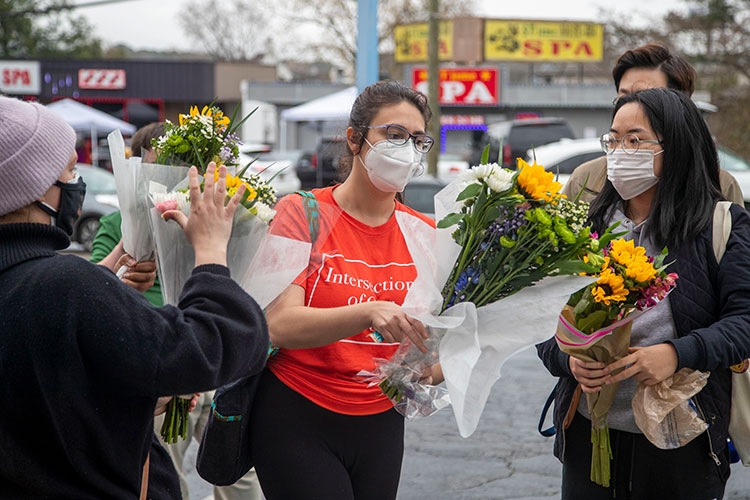States
Unveiling The Deep-rooted Misogyny And Racism In The Georgia Attack

The eight-person Georgia Attack revealed a frightening link between prejudice and violence. The shooter’s reasons are still being investigated, but experts are suggesting that mainstream racism may have prompted the tragic incident, which killed six Asian women.
While law enforcement and the FBI are investigating the shooter’s motives, the stunning brutality and apparent targeting of massage parlors raises racial considerations. The confluence of sexism and racism is dangerous and must be addressed.
UC Berkeley researcher Alex DiBranco said the Georgia assaults fit a trend of sexist violence based on women’s dehumanization and men’s claim to women’s bodies. Since the gunman killed primarily Asian women, bigotry is unavoidable. The assault challenges mainstream society’s racial preconceptions and their ability to cause violence.
Georgia Attack: The Deep Roots Of Racism And Misogyny
The Georgia shooting highlighted our society’s pervasive bigotry. While investigating the shooter’s reasons, it is clear that sexism and racism are firmly ingrained in our community.
Violence against Asian Americans has climbed 2.3 times in the last year, with women reporting more than males. Famous politicians, including the Republican Party and the past president, have used xenophobic language to promote this rise in bigotry. These examples show that mainstream culture tolerates and even encourages discrimination.
Confronting Racism And Misogyny
We must confront these concerns after the Georgia assaults and the unsettling link between racism and sexism. Racism and misogyny are firmly ingrained in our society, making they must be addressed.
Combating damaging gender stereotypes in K-12 education is a crucial suggestion. Our school system must be redesigned to prioritize gender and racial fairness. Comprehensive, consent-based sexuality education and English and history curriculum reforms may help break these misconceptions.
Research and program design to combat extremist beliefs must be funded urgently. We can break down long-standing racism and sexism by tackling these problems at their origins.
Racism and sexism are pervasive in mainstream culture, as the Georgia assaults show. Early education interventions and extensive research and program design expenditures are needed to address these difficulties. We can only establish a more inclusive and fair society by addressing these issues at their root.
The Role Of Stereotyping In Perpetuating Racism
Stereotyping has historically perpetuated racism in society. After the Georgia killings, assumptions and prejudices must be examined regarding violence against minority populations. This tragedy affected primarily Asian women, whose identities were formed by cultural preconceptions.
Asian women are objectified and dehumanized by media and pop culture stereotypes of submissiveness and exoticism. Stereotypes make Asian women seem vulnerable to assault and exploitation. The Georgia shooter shows how preconceptions may have far-reaching effects.
Stereotypes interact with various oppressions. The “model minority” perception of Asian Americans being intellectually competent and submissive erases Asian variety. This erasure may hide Asian women’s prejudice and abuse and reinforce the assumption that their voices and experiences are unimportant.
Multifaceted approaches are needed to address racist stereotypes. It requires media that authentically reflects Asian diversity and fights damaging preconceptions. Education and awareness initiatives to identify and overcome prejudices are also recommended. We can only remove racism that leads to such atrocities by destroying these prejudices.
Read Also: Georgia Joins Growing List Of US States Banning ‘Divisive’ Concepts In Race Education
The Urgent Need For Anti-racist Policies And Education
Our society needs anti-racist measures and broad education after the Georgia atrocities. These measures are essential for tackling mainstream culture’s fundamental racism and sexism.
Implementing anti-racist measures at all levels of government and institutions is crucial to tackling these concerns. These measures should denounce racism and fight structural prejudice. To comprehensively address sexism and racism, people must be held responsible inside and beyond the judicial system.
Education is crucial to fighting racism and sexism. Anti-racist and gender-inclusive education must be provided at all levels in addition to early K-12 initiatives. This strategy should challenge negative prejudices, build empathy and understanding, and encourage social responsibility for equality.
Additionally, cultural competency and stereotype-busting awareness initiatives and activities must be emphasized. Education of racism and misogyny’s history and effects may foster a more sympathetic and fair society.
Racism and misogyny in mainstream culture must be addressed immediately after the Georgia assaults. Creating a more inclusive and equitable future requires addressing racism’s assumptions and prejudices, anti-racist legislation, and comprehensive education. These efforts are necessary to prevent tragedies and create a diverse, egalitarian society.
Amplifying Voices And Experiences Of Marginalized Communities
The Georgia shootings showed that promoting underrepresented perspectives and experiences is crucial to fighting mainstream racism and sexism. Asian women victims of this tragic tragedy are generally calm and ignored. It’s time to value their voices and tell their tales.
Asian Americans and other marginalized groups have long been underrepresented in media and public debate. Those in power typically ignore their racism and sexism. We must provide these speakers a venue to express their tales and thoughts after the Georgia assaults to shift this narrative.
This voice amplification extends beyond social media and hashtags. It entails fostering discourse, promoting various perspectives, and supporting disadvantaged community empowerment groups. It also requires aggressively contesting the idea that only certain voices matter.
Allies and activists must utilize their positions to elevate their voices. Standing in solidarity and listening to oppressed populations may help break down ignorance and apathy that promote racism and sexism.
Building Solidarity And Intersectional Activism
The Georgia assaults demonstrate that racism and sexism are intertwined and cannot be handled separately. Solidarity and intersectional action are needed to address these deep-rooted injustices.
Solidarity is acknowledging that racism and misogyny are everyday struggles. It requires admitting that diverse types of prejudice exacerbate disadvantaged people’s problems. Recognizing these linkages helps us create a more inclusive and fair society.
Intersectional activism addresses various types of prejudice at once. It is vital to realize that racism, misogyny, and other biases are not isolated. They reinforce each other; thus, it’s crucial to fight all sorts of prejudice.













You must be logged in to post a comment Login